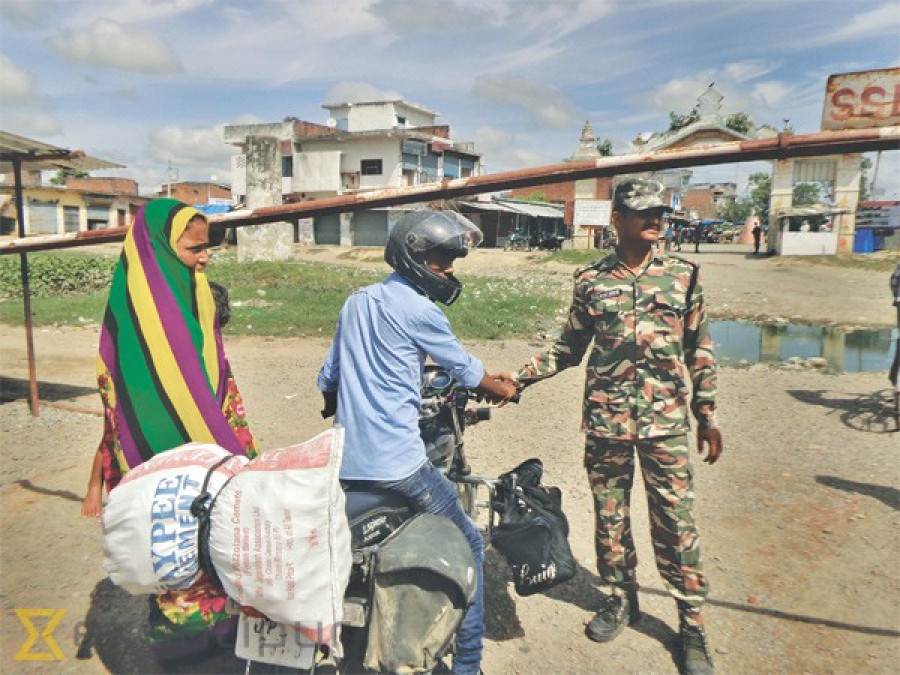National
As India steps up measures to control coronavirus spread, smaller border points with Nepal likely to be closed
Indian embassy says measures, however, do not currently have any impact on normal travel of Nepali nationals to India
Suresh Raj Neupane
As India has stepped up measures to control the spread of coronavirus, issuing a travel advisory for foreign and Indian nationals, its embassy in Kathmandu said on Thursday that the current measures are solely for the purposes of managing public health safety and that these measures do not have any impact on normal travel of Nepali nationals to India.
“Keeping in view the ramifications of current global spread of Covid-19 on public health and safety, certain health safety measures are being implemented for foreign and Indian nationals entering into and exiting from India,” the Embassy of India said in a statement. “The primary intention is to ensure the health and safety of both Indian as well as foreign nationals with bare minimum inconvenience to travel and mobility. These measures would be continuously reviewed depending on the evolving situation.”
These measures, however, according to the embassy, do not currently have any impact on normal travel of Nepali nationals to India—either by air or by existing land routes
Nepal and India share about 1,800-kilometre open border, and thousands of people cross the border daily. About two dozen checkpoints, half of them major ones, are officially in operation along Nepal-India border.
A senior official at the Nepali embassy in New Delhi said though there has been no formal communication from the Indian side, India could close some smaller border points in the wake of the global coronavirus outbreak.
As of Thursday, India has reported 73 confirmed cases.
The official said that the Indian side may take a decision to open only those borders which will not block the supply system to Nepal.
If the decision is made to close small border points, it will mostly affect those Nepalis who go to India for work from rural parts.
India has already closed its border with Myanmar since last Tuesday.
India has said it will suspend issuing visas, barring a select few categories, to foreigners effective from Friday. The suspension will remain until April 15.
The embassy said that existing travel arrangements for Nepali nationals will remain unaffected.
“There will be intensified health inspections at all entry points and any traveller, Indian, Nepali or from third countries presenting Covid-19 symptoms or with recent travel history to China, Italy, Iran, Republic of Korea, France, Spain and Germany may possibly be subject to quarantine if so required,” said the embassy.
***
Frequently asked questions about the coronavirus outbreak
UPDATED as of March 15, 2019
What is Covid-19?
Covid-19, short for coronavirus disease, is an illness caused by the coronavirus SARS-CoV-2, short for severe acute respiratory syndrome coronavirus 2. Common symptoms of the disease include fever, dry cough, fatigue, shortness of breath and breathing difficulties. In severe cases, infection can cause pneumonia, severe acute respiratory syndrome, kidney failure and even death.
How contagious is Covid-19?
Covid-19 can spread easily from person to person, especially in enclosed spaces. The virus can travel through the air in respiratory droplets produced when a sick person breathes, talks, coughs or sneezes. As the virus can also survive on plastic and steel surfaces for up to 72 hours and on cardboard for up to 24 hours, any contact with such surfaces can also spread the virus. Symptoms take between two to 14 days to appear, during which time the carrier is believed to be contagious.
Where did the virus come from?
The virus was first identified in Wuhan, China in late December. The coronavirus is a large family of viruses that is responsible for everything from the common cold to Middle East Respiratory Syndrome (MERS) and Severe Acute Respiratory Syndrome (SARS). After an initial outbreak in Wuhan that spread across Hubei province, eventually infecting over 80,000 and killing more than 3,000, new infection rates in mainland China have dropped. However, the disease has since spread across the world at an alarming rate.
What is the current status of Covid-19?
The World Health Organisation has called the ongoing outbreak a “pandemic” and urged countries across the world to take precautionary measures. As of Sunday, Covid-19 had spread to 125 countries and infected more than 156,583 people with 5,947 deaths. In South Asia, India has reported the highest number of infections at 84, with two deaths. Nepal has so far reported just one case where the patient recovered.
How dangerous is the disease?
The mortality rate for Covid-19 is estimated to be 3.6 percent, but new studies have put the rate slightly higher at 5.7 percent. Although Covid-19 is not too dangerous to young healthy people, older individuals and those with immune-compromised systems are at greater risk of death. People with chronic medical conditions like heart disease, diabetes and lung disease, or those who’ve recently undergone serious medical procedures, are also at risk.
How do I keep myself safe?
The WHO advises that the most important thing you can do is wash your hands frequently with soap and water for at least 20 seconds or use hand sanitizers with at least 60 percent alcohol content. Avoid touching your eyes, nose and mouth with unclean hands. Clean and disinfect frequently used surfaces like your computers and phones. Avoid large crowds of people. Seek medical attention if symptoms persist for longer than a few days.
Is it time to panic?
No. The virus has miraculously not entered Nepal yet, except for one case in January. So far, no one else has tested positive for Covid-19 and the government has imposed travel restrictions to limit the spread of the virus. There is no need to begin stockpiling food, cooking gas or hand sanitizers. However, it is always prudent to take sensible precautions like the ones identified above.




 8.79°C Kathmandu
8.79°C Kathmandu















